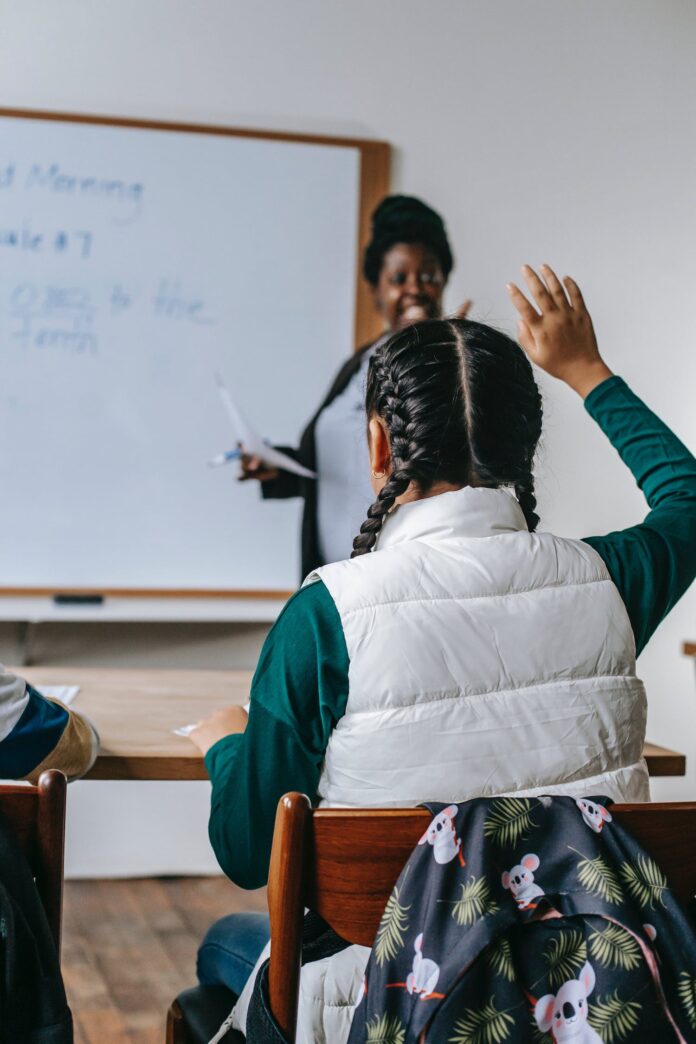
When Claudine Gay, Harvard’s first Black president, stepped down, it sent shockwaves rippling across the nation — and sparked plenty of worry over the future of education. For months, Republican presidential hopefuls like Nikki Haley and Ron DeSantis have doubled down on whitewashing history, all while colleges and universities ditch their diversity, equity, and inclusion policies.
But that hasn’t stopped educators from continuing to advocate for incorporating Black studies into education, including at the K-12 level.
Helping lead the charge is Sonya Douglass, professor of education leadership at Teacher’s College, Columbia University. In 2017, she launched the Black Education Research Collective, creating a powerful alliance of scholars and researchers dedicated to enhancing and improving the educational experiences and outcomes for Black students.
As the director, Douglass helped lead the charge in the development of the first-ever PK-12 interdisciplinary Black Studies Curriculum being integrated into the classrooms across New York City. The course arose from the Education Equity Action Plan, which mandates schools teach about the heritage of African descendants.
Douglass tells Word In Black that founding the collective “was a chance to bring together our Black doctoral students, faculty, those interested in education” to take action. The group makes connections between history, culture, politics, and identity to broaden opportunities for Black youth, who are systematically sidelined in the nation’s public schools.
To that end, Douglass and her peers have spent the past three years ensuring the curriculum is grounded in the needs of students and the community. In a Teacher’s College interview last fall, she said they’ve dedicated significant time to revising the lessons, and soliciting direct feedback from teachers, principals, and students.
“It’s been a really intense and exciting time given the history of the work that we’re doing,” Douglass said. “Our hope is that the children of New York City, and by extension, across the country, will be able to have access to a deeper and fuller
understanding of the history of this country — because we’re including a Black perspective, and that, as a result of that, it will, I think, really improve cross-cultural understanding, I think a sense of confidence, particularly for students who identify as Black or African American, and really help us to begin to build the type of education that we know all children deserve.”
Since 2021, at least 18 states have passed laws restricting or banning the teaching of supposed critical race theory, the current code word for teaching about Black history. Critical race theory is actually a framework used at the college level, particularly in academic journals. So the odds of Johnny’s teacher slipping it into lessons between math and recess are slim to none.
On the flip side, 12 states — Arkansas, Colorado, Delaware, Florida, Illinois, Mississippi, New Jersey, New York, Rhode Island, South Carolina, Tennessee, and Washington — currently mandate the teaching of Black history, although, as The 74 reported, “several of the 12 states have new laws on the books that limit their curriculum.”
There’s growing recognition that teaching Black studies in schools is part of ensuring students achieve academically — and plenty of other things need to change in public education for that to happen.
A Need for System-Wide Change
Though Douglass once dreamed of founding her own socially conscious school, she realized she could spur change within existing systems.
Now, like many educators today, Douglass says it’s “time to build a new house” — and completely rethink our education vision. Families must mobilize across state lines, she urges, while teachers should rediscover their calling.
“It’s really time to sit down and re-envision what we want for education in the United States,” Douglass says. “ I actually think we have to change the goals that we’ve set for ourselves.”
TikTok is full of videos from teachers sharing how behind their students. Most parents think their child is at or above grade level in reading and math, but the reality is far from that. And these students — many of whom were already struggling academically — need additional support inside and outside the classroom that teachers simply don’t have the bandwidth for.
To elevate student achievement, Douglass emphasizes the importance of community support for overburdened teachers. Given the alarming data on students’ learning gaps and academic decline, teachers face significant challenges, often without sufficient support. Douglass advises teachers to practice self-compassion, acknowledging the overwhelming demands placed on them.
A Collective Effort Is Needed
“One of the first things that is important is for teachers to be kind to themselves and to show themselves some grace and mercy,” Douglass says. She says society puts a “heavy weight” on teachers in a system that “has been struggling for a very long time to do what’s right by children, and it’s going to take a collective effort among teachers and parents and community members, business industry, media, politics, everyone to decide again, what we want our public education system to look like.”
In addition, Douglass also suggests teachers remind themselves why they decided to educate children in the first place.
“I don’t think we’ve spent enough time looking inward and again, reflecting on who we are. Why did you go into education?” Douglass says. “How does your own cultural identity and background, gender, and identity inform your work and how you teach? To what extent does that help facilitate learning for students, or maybe even serve as a barrier?”
Even amid the current political pushback to Black studies, culturally relevant teaching is working, Douglass says. Schools should support it through training, peer groups, and learning about students.
“One of the main reasons why this curriculum is important is because I think what we have now is underwhelming,” Douglass says. “It doesn’t teach the complete and comprehensive truth of what’s happened in our country, and the different experiences that different non-European groups have contributed to the country.”



